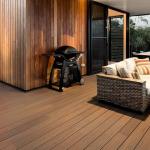
Is composite decking worth the money?
Deciding if a composite deck suits your needs and budget involves weighing up its advantages and disadvantages.
Here's an analysis to guide your choice:
Advantages of Composite Decking:
Additional Considerations:
Further Reading:
Here's an analysis to guide your choice:
Advantages of Composite Decking:
- Minimal Upkeep: Unlike wood, it doesn't require frequent staining or sealing. A simple sweep or hose-down is sufficient for cleaning. Maintenance costs can be as low as $5.00 per year.
- Longevity: Resistant to rot, fade, warping, and pests, composite decking can endure over 25 years with little maintenance.
- Safety: It's less slippery than wood, even when wet, offering a safer environment for families with kids or pets, and especially when used as pool decking.
- Aesthetic Appeal: Available in numerous colours and designs, it can complement your home's style and your personal preferences.
- Eco-Friendly: Often made from recycled materials, it presents an environmentally responsible alternative to wood.
- Initial Expense: It's pricier than wood at the outset, though lower maintenance costs can offset this over time - often in as little as five years.
- Heat Retention: In direct sunlight, cheaper composites can become uncomfortably warm underfoot.
- Susceptibility to Scratches: Again, cheaper composite timber decking is more easily scratched by furniture or pet claws.
- Appearance: Some may find its uniform look less appealing compared to the natural aesthetic of wood. This is why you should insist on a natural-look timber composite.
Additional Considerations:
- Deck Size: The cost escalates with the size of your deck. Use our composite decking price calculator to help with budgeting your next project.
- Local Climate: In warmer climates, opt for a variant that remains cooler.
- DIY Skills: If you're adept at DIY, you could install it yourself. Otherwise, professional installation will add to the cost.
Further Reading:
